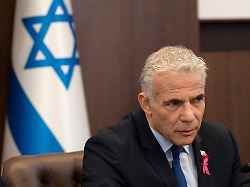Gas fields are divided
Israel and Lebanon agree on sea border
10/11/2022 1:28 p.m
After years of negotiations, Israel and Lebanon reach a compromise over their shared sea border. This means that there is now clarity about natural gas production in the Mediterranean. The agreement was initiated by the USA.
After difficult negotiations, Israel and Lebanon have reached an agreement to demarcate the Mediterranean Sea, settling their dispute over offshore gas fields. “This historic agreement will strengthen Israel’s security and flush billions into the Israeli economy,” said Israeli Prime Minister Jair Lapid in Jerusalem. The agreement could also help Europe diversify its natural gas supply sources.
In the face of Russia’s war of aggression in Ukraine and its aftermath, Israel has pledged to export more gas to Europe. The United States mediated the agreement between Israel and Lebanon, which are officially still at war and have no diplomatic relations. The negotiations had started in 2020, but were repeatedly blocked.
Lapid said the Israeli security cabinet was holding a meeting on the agreement on Wednesday. After that, the government’s approval will be obtained at a special meeting of the full cabinet before the agreement is presented to parliament.
Israel receives part of the proceeds
Israel and Lebanon signaled their approval of US envoy Amos Hochstein’s draft agreement on the gas fields in early October. According to press reports and information from negotiating circles, it stipulated that Israel would be given control of the Karish gas field. Israel’s preparations for gas production there are already underway. Contracted energy company Energean announced Sunday tests for connecting its drilling platform to mainland Israel.
Lebanon will be allowed to produce natural gas from the Cana gas field further northeast, although part of the gas field lies beyond a planned demarcation line between the two countries’ territories. In return, Israel is to receive part of the proceeds from Cana natural gas.
On Thursday, however, Israel announced that it rejected changes to the draft requested by Lebanon. Negotiations have continued over the past few days. Shortly before Lapid’s statement, the chief Israeli negotiator, Eyal Hulata, announced the breakthrough. “All of our demands have been met,” he said. “Israel’s security interests” were protected.
Preparations needed in Cana gas field
For his part, the Lebanese negotiator, Vice President Elias Bou Saab, said: “Today we have reached a solution that satisfies both sides.” Lebanon has “received its full rights and all its comments have been taken into account”. Saab forwarded the agreement to Head of State Michel Aoun. The presidential office in Beirut expressed the hope that “the agreement on the demarcation line would be announced as soon as possible”.
Lebanon is also very interested in exploiting the gas reserves in the Mediterranean. The country has been suffering from the worst economic crisis in its history since 2019. The national currency has drastically lost value, and poverty and unemployment have recently risen sharply. Extensive preparations are still necessary before production can begin in the Cana gas field. The French energy group Total has been commissioned to produce the gas. According to Saab, Total and not Lebanon should make the compensation payments to Israel. According to the Lebanese news agency ANI, Total Middle East boss Laurent Vivier traveled to Lebanon.
The agreement on the border agreement came just under three weeks before the end of Lebanese President Aoun’s term on October 31. A day later, a new parliament is elected in Israel – for the fifth time in three and a half years. Ex-Prime Minister Benjamin Netanyahu and his allied ultra-Orthodox and right-wing parties could return to power. Netanyahu accused Lapid last week of “surrendering” to Lebanon with the planned agreement.
